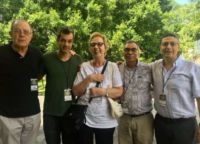The politico-cultural and ecclesial context make for us difficult today to publicly assume the social conflict as a starting point for theological reflection. “Affirmative action”, the look positive, pragmatic and fundamentalist replaced the action and critical reflection on society and the churches. Many times, the aesthetic and the show take precedence over ethics. We need, therefore, to recover critical and, prophetically, detuning the choir of the conniving and pleased ones.
How be responsible and happy in a world marked by poverty, exclusion, violence and alienation? How to make our “the joys and hopes, sorrows and anxieties of humanity today, especially of the poor and those who suffer” (GS 1)? We believe that “good living” as a new global paradigm is possible for all. (vision of some , not all)
Our theological optimism is weaved with the realism of the poor suffering and the victims of major transversal crises of our planet Earth which are the crisis of the economic model, the social crisis, the crisis of the denial of the experiential space (migration), the ecological crisis, the cultural crisis, crisis of liberal democracy and the formal justice. Humanity central challenges that emerge from these multiple, connected and causing crises of violence, in this beginning of the 21st century, are also challenges for theological praxis.
Download the document



Leave A Comment
You must be logged in to post a comment.